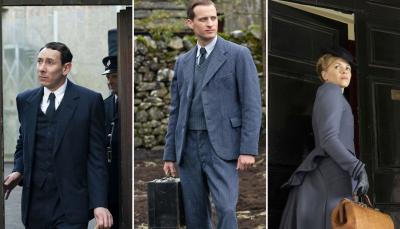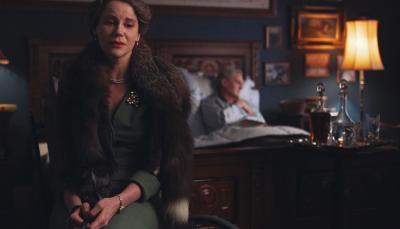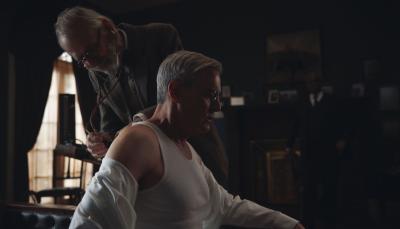'Atlantic Crossing' Episode 5 Recap
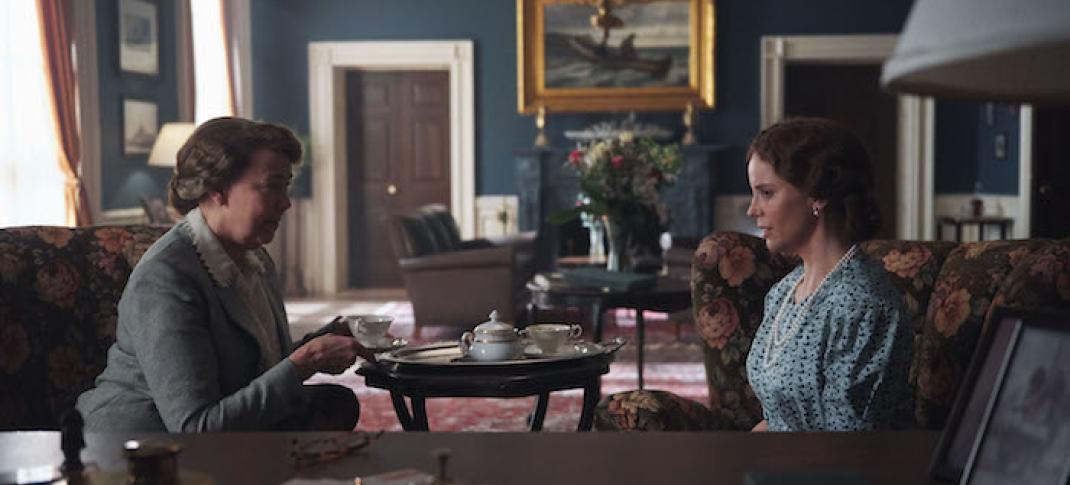
MASTERPIECE “Atlantic Crossing" Sundays, April 4 - May 23, 2021 on PBS Episode Five Sunday, May 2, 2021; 9-10pm ET on PBS Martha uses dinner-table tactics to help Norway. The first lady gives Martha unusual lessons in public speaking. The president gets on dangerous ground with Martha. Shown from left to right: Harriet Sansom Harris as Eleanor Roosevelt and Sofia Helin as Crown Princess Martha For editorial use only. Courtesy of MASTERPIECE.
Julie VRABELOVA-julvrab.com
Episode 5 of Atlantic Crossing opens with a scene of a crowd outside the White House protesting America’s involvement with the war after the introduction of the Lend-Lease Bill. Inside, Eleanor Roosevelt reminds her husband that a lot of Americans are very disappointed in his actions, and he points out that a lot of people will be very pleased at the jobs that will be created because of the bill. So, business as usual.
At Pook’s Hill, Märtha and Olav host a dinner party where Roosevelt, the Norwegian Ambassador, and members of Congress are invited to gain support for the Lend-Lease Bill. Olav reports to Märtha that things aren’t going so well, but she has a surprise for everyone. With guests seated, Märtha announces a special guest (not Roosevelt, this time, she says, to the President’s amusement) and introduces Alfred Isaksen, the injured sailor who was featured in the previous episode. Cleaned up, he still presents a stark contrast to the other well-heeled guests, and his brief statement is impassioned. Because of losing his legs, he admits he has been in a dark place—Roosevelt takes notice here. There’s silence which Roosevelt breaks with applause.
Olav, as surprised as the other guests, is not impressed. He takes Märtha aside and refers to Alfred’s presence as “your little gimmick,” and accuses her of taking risks. She is justifiably angry and tells Olav that until he moves in with the family, she is in charge and will make the decisions about what happens at her dinner parties
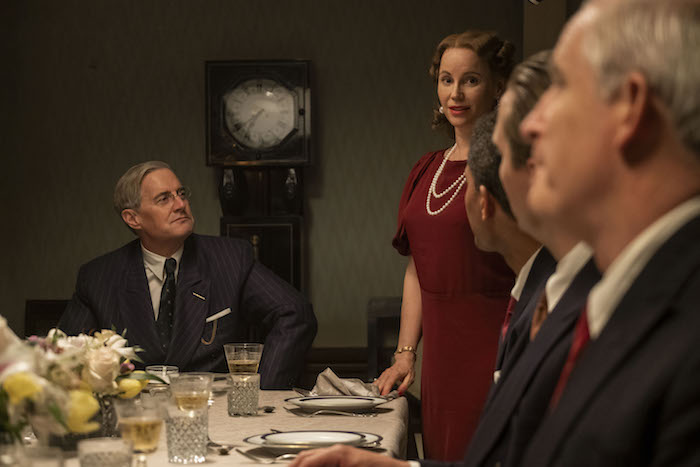
The Lend-Lease Act passes 260-165, and an official Norwegian Embassy event is held to celebrate. Ambassador Morgenstierne officially acknowledges not Märtha, but Olav as the catalyst for the lobbying that ensured passage of the bill. Märtha is shocked. Olav tries to give Märtha credit (although “last but not least” may not be the best choice of words) but it's too late—she's left the room.
Three months later, protests against the Lease-Lend Act continue, and at home, Märtha listens to Churchill on the radio while her children bicker. Roosevelt arrives and invites her on a drive, and she’s glad to get away, but she’s angry. No armaments have been provided, and she is thinking that the Lend-Lease Act is a sick joke. Roosevelt takes his usual stance that he can’t do anything because he’s President of the U.S., but she can. He suggests she mobilize her public, and why not start with a speech to the American Friends of Norway?
Given her horror of public speaking, this effectively silences her, but she’s still trying to find a way in which she can be effective. When she sees a group of injured Norwegian sailors being unloaded at the Naval Hospital, she asks Morgenstierne what happens to them when their medical treatment is over. Lodgings are found for them, but frequently they are sent to homeless shelters. She’s shocked. She lives in a huge house, she has room, and they should stay with her. Now it’s the Ambassador’s turn to be shocked.
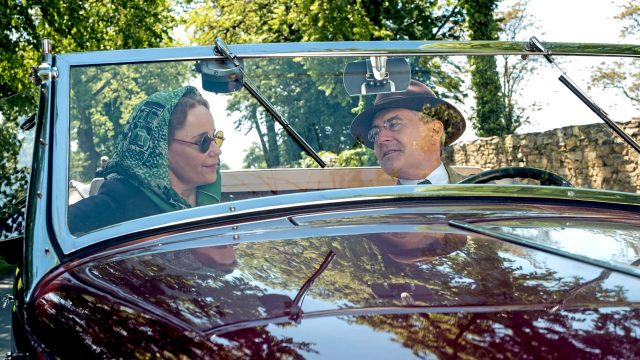
On the other side of the Atlantic, the Norwegian Royal Family reacts to this news during a vicious game of croquet. King Haakon laments that “their house will be full of sailors.” Olav, to his credit, because he’s basically a good guy and he probably still feels bad about Märtha’s lack of official recognition, defends her decision.
We see Märtha welcoming a group of Norwegian sailors to her house and while it’s clear to them that she’s royalty and won’t be hanging out with them much in the part of the house allocated to them, she’s low-key and friendly. In fact, she’s the one who crosses the class lines when the entire house is woken by a very young sailor screaming in his sleep, reliving the horror of his ship sinking. No one can wake him, but Märtha sits on his bed and soothes him until he settles down again. It’s one of those moments when she’s hit by the reality of the war, and it unsettles her.
She goes into the kitchen to make tea, and as she sits in the dark, the young sailor who had the nightmare, Otto, comes into the kitchen and drinks out of the faucet. She offers him a cup of tea, and they talk. She is shocked to realize how difficult life is for people in Norway under the German occupation. Otto’s parents were glad to see him leave on a fishing boat for England because then there would be more food for the rest of the family. His mother had to make bread from bark because flour is so scarce, along with other staples.
Meanwhile, in the White House Missy is ranting at Roosevelt. Märtha is manipulating him, she tells him, and doesn’t return his feelings for her: “All she sees is an old man who happens to be President.” Ouch.
But the next time Märtha visits the White House, it’s to see Eleanor Roosevelt, not the President. She needs help in learning to speak more effectively in public since Morgenstierne has arranged a huge fundraising event for Norwegian aid at Madison Square Gardens with the Rockettes and other entertainment. Extensive media coverage is expected, and it’s going to be the beginning of a national tour. Eleanor is courteous, surprised, but regrets that she’s too busy to help Märtha.
Dejected, Märtha returns home and is found by Otto, the sailor she befriended, now well enough to go back to sea. He’s scared and asks her what she’s most afraid of. She admits to deep-seated insecurity, that she’s afraid that people will see her as she really is. They make a deal that they will both be brave and do the right thing.
Meanwhile, in Norway House, London, there’s a joyful reunion. Ulla and Rolf, the daughter and son of Nikolai Østgaard(Olav’s adjutant) and Ragni Østgaard (Märtha’s companion) have made it back to England. Ulla is engaged to Erling Hammershøy (Sjur Vatne Brean) who helped them escape. Ragni weeps with joy and relief when they phone with the good news.
But otherwise, things aren’t going so well for the Norwegians in exile. Olav wants Fleisher to be made Chief of Defense and asks his father for support with the Cabinet. You may remember he wanted the position himself, so now he’s compromising with the suggestion of his very capable colleague. However, the King is not so keen and neither is the Cabinet. They consider Fleisher uncouth (I’d think that would be a selling point) and also complain that every time there is a mission there are too many Norwegian deaths. Olav is furious. That is all the more reason to retaliate.
Seeking to stir up trouble, Missy informs Eleanor that Roosevelt has gone to visit Märtha for “advice and comfort,” and shows her the front-page newspaper article about Pook’s Hill being opened up to house Norwegian sailors. But this has the opposite effect Missy intended. Impressed, Eleanor is suddenly not quite so busy and sets off to visit Märtha herself:
May I be frank with you? Well, to be perfectly honest when you first arrived, I saw a shy and complacent princess with a narrow and subjective perspective on the events that now shake the world. But I realize I’ve been wrong about you, Märtha. Do you still want my help?
Now as patronizing as this sounds, I think it’s first, the way Eleanor was, and Märtha takes it with good grace and accepts her offer. Märtha rehearses her speech, and Eleanor, with great perception, comments gently that references to peace and freedom are too abstract. What does she, Märtha, want? Her response:
I want to go home … the house Olav and I built, the roses I planted, the children’s climbing tree. Our horses, our beds. Our routines, just everyday life. That is what I want.
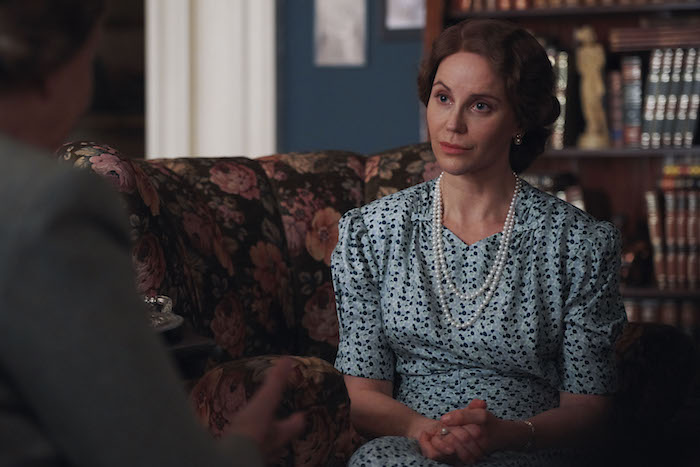
Then begins an extraordinary sequence of the First Lady of the U.S. and the Crown Princess of Norway being silly. Shoes off, they dance, make ridiculous sounds, use items in the room as props for absurd improvisations, and have fun. It’s all designed to make Märtha acknowledge her inner self, to bring that frightened person inside into the open and make her shine. She tells the Ambassador she’ll do the tour, and she’ll write her own speeches.
And it works, although backstage at Madison Square Gardens she’s nervous and when she goes on stage there’s a long, worrying silence as she collects herself. She begins “It was a beautiful day in April …” and we see flashbacks to that happy time with her family, followed by footage of the invasion, and finally Otto waving goodbye to Märtha as he boards the bus to go back to war. She receives a standing ovation from the audience. In London, Olav fights back tears, and in the U.S., Roosevelt laughs with pleasure. As she comes offstage, she and Ragni hug each other for the first time, and Eleanor jokingly comments, “It was OK, we need to work on your articulation.” It’s a lovely moment of female affection and solidarity.
But because the Norwegian Cabinet always seems to be at cross-purposes with common sense and their crowned leaders, they decide that the security costs for the tour are too high. Olav is furious but calls the Ambassador to tell him of the decision, and just as Märtha is about to leave the house to start her tour, she receives the devastating news.
It’s the end of the day in the White House and Roosevelt’s assistant Harry Hopkins, on his way out, meets Missy, and mentions that the President is leaving. Missy, knowing he’s going to Marthä’s, is agitated and upset, and begs him to stay--there will be cocktails! Movies! Her! He accuses her of that egregious sin of “making a scene” before driving off.
Roosevelt picks Marthä up and they drive off, Secret Service following until he plays his usual trick of pulling onto a side road and parking. He announces he has something for Märtha and hands her a package of papers, which she recognizes as the records from the 1939 trip she and Olav made. In other words, it’s the groundwork for the security detail, and it will solve the problem of the cost for security for her tour. She hugs him in gratitude, but it’s a hug that goes on a little too long and turns into a rather clumsy, hesitant kiss. Roosevelt has his pince-nez off—the man means business—but he backs off as the Secret Service pulls up behind his car, and looks bewildered.
Roosevelt and Märtha both return to their homes, deep in thought. What will this do to their relationship? What do you think?


